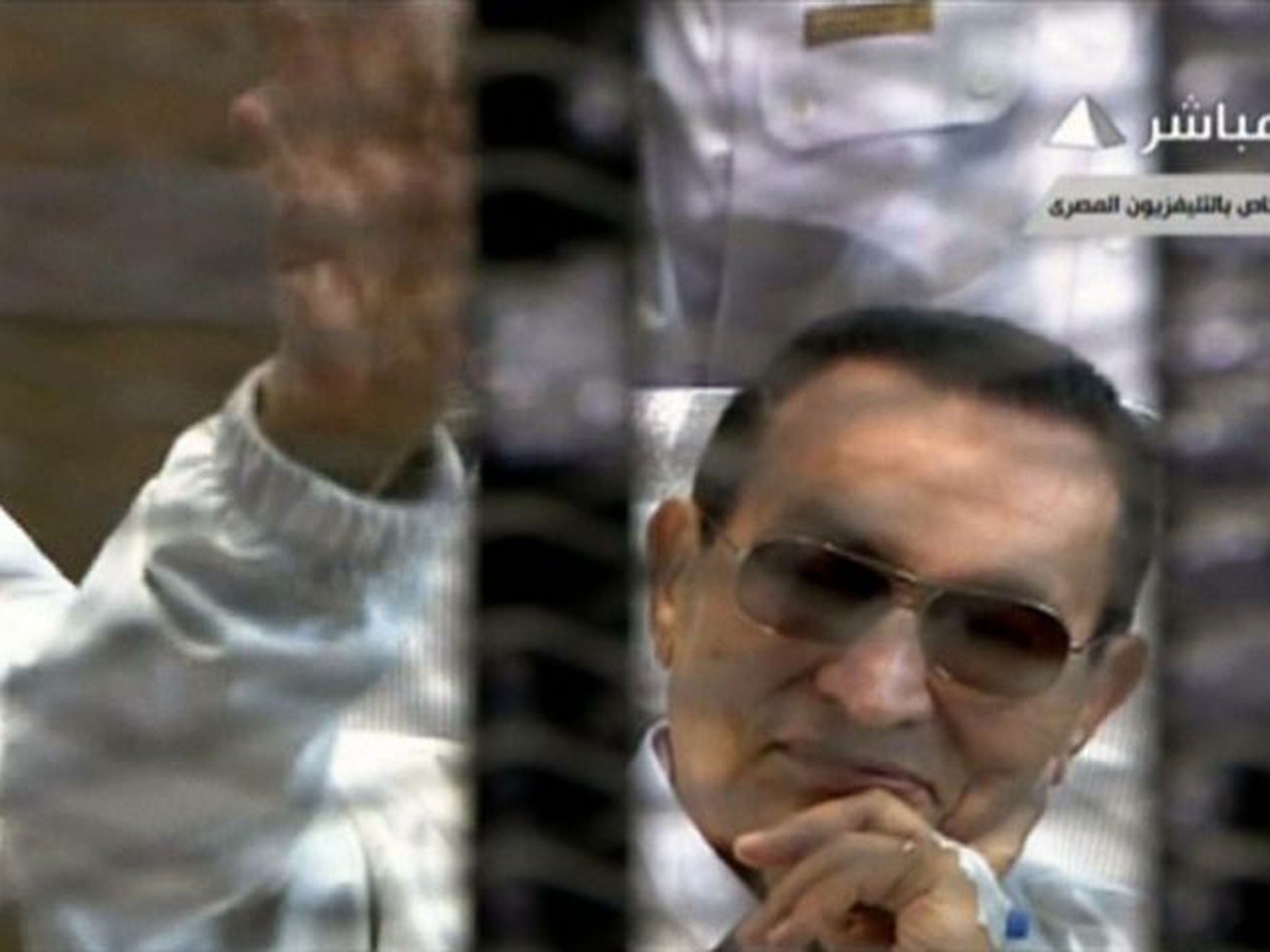Anger as retrial of Egypt's former President Hosni Mubarak aborted

Your support helps us to tell the story
From reproductive rights to climate change to Big Tech, The Independent is on the ground when the story is developing. Whether it's investigating the financials of Elon Musk's pro-Trump PAC or producing our latest documentary, 'The A Word', which shines a light on the American women fighting for reproductive rights, we know how important it is to parse out the facts from the messaging.
At such a critical moment in US history, we need reporters on the ground. Your donation allows us to keep sending journalists to speak to both sides of the story.
The Independent is trusted by Americans across the entire political spectrum. And unlike many other quality news outlets, we choose not to lock Americans out of our reporting and analysis with paywalls. We believe quality journalism should be available to everyone, paid for by those who can afford it.
Your support makes all the difference.The retrial of former Egyptian President Hosni Mubarak collapsed today when the presiding judge withdrew from the case and referred it to another court, causing an indefinite adjournment that sparked anger in the courtroom.
"The people demand the execution of Mubarak!" relatives of demonstrators killed in the 2011 uprising that overthrew him chanted in court after presiding Judge Mustafa Hassan Abdullah announced the decision at the opening session.
Outside the heavily guarded compound, pro-Mubarak demonstrators outnumbered opponents. The two groups were kept well apart by a police cordon and there were no incidents.
Mubarak, 84, who ruled Egypt for almost 30 years before being toppled by 18 days of Arab Spring pro-democracy unrest, waved and smiled to supporters from the defendants' cage in the courtroom before the brief hearing began.
He was flown by helicopter from a military hospital where he has been detained to the police academy used as a courthouse, and wheeled from an ambulance into the building lying on a hospital trolley wearing a white tracksuit.
Mubarak, former Interior Minister Habib al-Adli and four top aides face a retrial for complicity in the murder of more than 800 protesters after the highest appeals court accepted appeals by both the defence and the prosecution in January. Two other senior interior ministry officials face lesser charges.
But the judge, who like most of the current judiciary was appointed under Mubarak, said he had decided to refer the case to the Cairo appeals court as he felt "unease" in reviewing the case. He did not explain his decision further.
He has previously acquitted top former Mubarak era officials on charges of orchestrating violence when pro-democracy activists were attacked by thugs riding on camels in Cairo's central Tahrir Square.
"We ask for the harshest possible sentence on Mubarak due to the cruel crimes he committed against the protesters, but we are happy with the judge's decision to withdraw as we had worries about him given his ruling (on) the camel attack case," said Mohamed Abdel Wahab, a lawyer for the victims.
It was the first time Mubarak, who wore gold-rimmed aviator sunglasses in court, had been seen in public since he and Adli were convicted last June on grounds of failing to stop the killing, rather than actually ordering it.
Mubarak's two sons, Alaa and Gamal, were also in court to be retried on separate charges of financial corruption.
Propped up on a gurney in a cage with the other defendants, he looked fitter and more relaxed than on previous appearances in the dock, holding animated conversations with his son Gamal, and occasionally smiling and waving to people in the courtroom.
Prosecutors accuse Mubarak of giving orders to Adli to open fire with live ammunition against protesters to suppress demonstrations across the Arab world's most populous country.
Mubarak and his interior minister were sentenced to life imprisonment at their first trial but the appeals court upheld complaints stemming from the weakness of the evidence offered by the prosecution.
Outside the court, pro-Mubarak demonstrators chanted "thirty years without destruction!" in reference to accusations that the Muslim Brotherhood movement which won free elections after his ouster are destroying the country.
"The word 'sorry' is not enough!" the pro-Mubarak crowd chanted. Some held posters of Mubarak and signs reading "Where are your days?"
"Look at the country now," said a supporter who gave his name as Ibrahim. "When Mubarak fell, there were $40 billion (in foreign reserves). And now after two years, we are going bankrupt. The whole country is suffering from this economic crisis, from this lack of security."
Across the square, relatives of victims of Mubarak's security forces held posters of young men killed in the revolt.
"What can I expect from this trial? If there was justice in this country, the first trial would have been fair," said Eman Saeed, whose 24-year old son Mohab died in January 2011 after marching from the working-class district of Shobra to Tahrir Square. Saeed said Mohab died from bullet wounds to the chest.
Mubarak became the first ruler toppled by the Arab Spring uprisings to stand trial in person. But the case has also exposed the difficulties of transitional justice in a country where the judiciary and security forces are still largely run by men appointed during the Mubarak era.
The prosecution complained that the interior ministry had failed to cooperate in providing evidence, leading to the acquittal of six senior ministry officials tried with Mubarak.
The trial irked Gulf Arab rulers in Saudi Arabia and the United Arab Emirates, of whom the former air force commander had been a loyal ally for decades.
Join our commenting forum
Join thought-provoking conversations, follow other Independent readers and see their replies
Comments